| Listing 1 - 9 of 9 |
Sort by
|
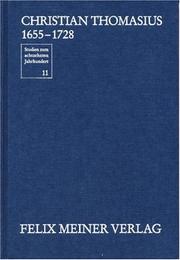
ISBN: 3787309225 Year: 1989 Volume: vol 11 Publisher: Hamburg Meiner
Abstract | Keywords | Export | Availability | Bookmark
 Loading...
Loading...Choose an application
- Reference Manager
- EndNote
- RefWorks (Direct export to RefWorks)
Thomasius, Christian --- -Congresses --- Addresses, essays, lectures --- Thomasius, Christian, --- Thomas, Christian, --- Tomásio, Cristiano, --- Thomasius, Christ. --- Thomasius, Thomas Christian, --- Thomasius, Christianus, --- Andersohn, Jacob, --- Anderson, Jacob, --- Ander Sohn, Jacob, --- Ander Sohn Holsatus, Jacob, --- Andersohn Holsatus, Jacob, --- Holsatus, Jacob Andersohn, --- Congresses.
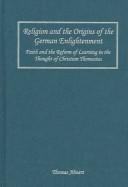
ISBN: 1281770752 9786611770754 1580466583 1580462049 Year: 2006 Publisher: Rochester, NY : University of Rochester Press,
Abstract | Keywords | Export | Availability | Bookmark
 Loading...
Loading...Choose an application
- Reference Manager
- EndNote
- RefWorks (Direct export to RefWorks)
The Enlightenment continues to be associated with the secularization and de-Christianization of intellectual culture in the West. And yet, religious thought played a far greater role in the emergence of the Enlightenment than is often recognized. In this book Thomas Ahnert analyzes the close relationship between religion and secular learning in the works of one of the central figures of the early German Enlightenment, the jurist and philosopher Christian Thomasius (1655-1728). Thomasius is now known mainly for his "enlightened" intellectual reform program, but Thomasius also believed that such reform necessarily involved a regeneration of Christian faith, which had been corrupted by self-interested clergymen and ecclesiastical institutions. This book is the first to examine the importance of Thomasius's complex religious beliefs for the entire spectrum of his main intellectual interests, which ranged from moral philosophy and law to history and the explanation of natural phenomena.
Thomas Ahnert is Lecturer in Early Modern Intellectual History at the University of Edinburgh.
Thomasius, Christian, --- Thomas, Christian, --- Tomásio, Cristiano, --- Thomasius, Christ. --- Thomasius, Thomas Christian, --- Thomasius, Christianus, --- Andersohn, Jacob, --- Anderson, Jacob, --- Ander Sohn, Jacob, --- Ander Sohn Holsatus, Jacob, --- Andersohn Holsatus, Jacob, --- Holsatus, Jacob Andersohn, --- PHILOSOPHY / General.
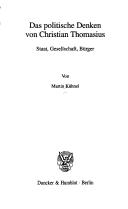
ISBN: 3428502604 3428102606 Year: 2001 Publisher: Duncker & Humblot
Abstract | Keywords | Export | Availability | Bookmark
 Loading...
Loading...Choose an application
- Reference Manager
- EndNote
- RefWorks (Direct export to RefWorks)
Der Aufklärer Christian Thomasius (1655-1728) gilt bislang kaum als politischer Denker von ideengeschichtlicher Bedeutung, und die in der Literatur zwischen "absolutistisch" oder "liberal" schwankenden Urteile sind aufgrund ihrer Materiallage selten verallgemeinerungsfähig. Dem Kernproblem eines fehlenden politiktheoretischen Hauptwerks stellt sich der Autor der vorliegenden Untersuchung mit einem systematischen Rekonstruktionsversuch seiner Staats- und Gesellschaftstheorie aus politikwissenschaftlicher Perspektive. Die abschließenden Charakterisierungen eines "rechtsstaatlichen Absolutismus" und eines "strukturkonservativen Sozialmodells mit emanzipatorischen, bürgerlich-individualistischen Potentialen" stehen für die paradigmatische Ambivalenz seines politischen Denkens im Umbruch zum 18. Jahrhundert. Zugleich deuten sie die von Thomasius' Gesamtwerk ausgehenden wesentlichen Impulse für die Entwicklung der modernen bürgerlichen Gesellschaft an, die nachdrücklich Beachtung verdienen.
Thomasius, Christian, --- Political and social views --- Philosophy --- Thomas, Christian, --- Tomásio, Cristiano, --- Thomasius, Christ. --- Thomasius, Thomas Christian, --- Thomasius, Christianus, --- Andersohn, Jacob, --- Anderson, Jacob, --- Ander Sohn, Jacob, --- Ander Sohn Holsatus, Jacob, --- Andersohn Holsatus, Jacob, --- Holsatus, Jacob Andersohn, --- Naturrecht --- Politische Ideengeschichte --- Ideengeschichte --- Philosophie der Wirtschaft --- Politische Theorie und Philosophie --- Absolutismus --- Staatslehre
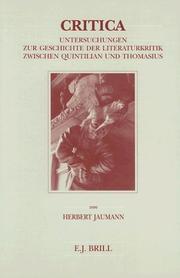
ISBN: 9004102760 9004247165 Year: 1995 Publisher: Leiden ; New York : E.J. Brill,
Abstract | Keywords | Export | Availability | Bookmark
 Loading...
Loading...Choose an application
- Reference Manager
- EndNote
- RefWorks (Direct export to RefWorks)
In answering questions such as what is 'modern' in literary criticism since the beginnings of the Early Modern age, this book does not follow the lines of René Wellek's famous History of Modern Criticism . It does not re-examine the history of literary theories and poetics. It rather focuses on the concepts and uses of what can be called 'practical criticism' ( Buchkritik ) and the historicity of its institutional and categorical frames of references. Viewing them as fundamental structures of literary production, reception and communication, this study traces the emergence of a temporalization of cultural processing, the periodical organization of a critical response as published in the new medium of the journal , and the development of different uses and functions of the literary canon . In analysis, two basic paradigms of criticism have to be confronted: the classical model of a critica perennis , as part of grammatica as an institution of learning, and the new conception and practice of critique mondaine , which emerges as an institution in its own right during the 16th and 17th centuries in Europe.
Criticism --- Quintilian --- Thomasius, Christian --- Criticism. --- Evaluation of literature --- Literary criticism --- Literature --- Rhetoric --- Aesthetics --- Technique --- Evaluation --- Quintilian. --- Thomasius, Christian, --- Thomas, Christian, --- Tomásio, Cristiano, --- Thomasius, Christ. --- Thomasius, Thomas Christian, --- Thomasius, Christianus, --- Andersohn, Jacob, --- Anderson, Jacob, --- Ander Sohn, Jacob, --- Ander Sohn Holsatus, Jacob, --- Andersohn Holsatus, Jacob, --- Holsatus, Jacob Andersohn,
Book
ISBN: 3511005876 Year: 1979 Publisher: Aalen
Abstract | Keywords | Export | Availability | Bookmark
 Loading...
Loading...Choose an application
- Reference Manager
- EndNote
- RefWorks (Direct export to RefWorks)
Educators --- Biography --- Thomasius, Christian, --- Thomas, Christian, --- Tomásio, Cristiano, --- Thomasius, Christ. --- Thomasius, Thomas Christian, --- Thomasius, Christianus, --- Andersohn, Jacob, --- Anderson, Jacob, --- Ander Sohn, Jacob, --- Ander Sohn Holsatus, Jacob, --- Andersohn Holsatus, Jacob, --- Holsatus, Jacob Andersohn, --- Bibliography. --- Universität Halle-Wittenberg. --- Friedrichs-Universität Halle --- Vereinigte Friedrichs-Universität Halle-Wittenberg --- Universität Halle --- Universität Wittenberg --- Martin-Luther-Universität Halle-Wittenberg --- Thomasius, Christian
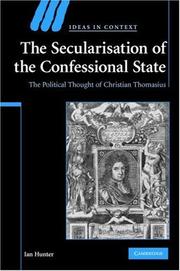
ISBN: 9780521880558 9780511490590 9780521200837 9780511379116 0511379110 0521880556 0511490593 0521200830 110718441X 1281243663 9786611243661 0511378246 0511377355 0511376413 0511374895 Year: 2007 Publisher: Cambridge ; New York : Cambridge University Press,
Abstract | Keywords | Export | Availability | Bookmark
 Loading...
Loading...Choose an application
- Reference Manager
- EndNote
- RefWorks (Direct export to RefWorks)
Christian Thomasius (1655-1728) was a tireless campaigner against the political enforcement of religion in the early modern confessional state. In a whole series of combative disputations - against heresy and witchcraft prosecutions, and in favour of religious toleration - Thomasius battled to lay the intellectual groundwork for the separation of church and state and the juridical basis for pluralistic societies. In this text, Ian Hunter departs from the usual view of Thomasius as a natural law moral philosopher. In addition to investigating his anti-scholastic cultural politics, Hunter discusses Thomasius' work in public and church law, particularly his disputations arguing for the toleration of heretics, providing a revealing comparison with Locke's arguments on the same topic. If Locke sought to base toleration in the subjective rights protecting Christian citizens against an intolerant state, Thomasius grounded it in the state's duty to impose toleration as an obligation on intolerant citizens.
Church and state --- Religious tolerance --- Tolerance, Religious --- Toleration --- Christianity and state --- Separation of church and state --- State and church --- State, The --- Thomasius, Christian, --- Thomas, Christian, --- Tomásio, Cristiano, --- Thomasius, Christ. --- Thomasius, Thomas Christian, --- Thomasius, Christianus, --- Andersohn, Jacob, --- Anderson, Jacob, --- Ander Sohn, Jacob, --- Ander Sohn Holsatus, Jacob, --- Andersohn Holsatus, Jacob, --- Holsatus, Jacob Andersohn, --- Church and state. --- Religious tolerance. --- Arts and Humanities --- History
Book
ISBN: 9783777616612 3777616613 Year: 2008 Volume: 81/2 Publisher: Stuttgart : Hirzel,
Abstract | Keywords | Export | Availability | Bookmark
 Loading...
Loading...Choose an application
- Reference Manager
- EndNote
- RefWorks (Direct export to RefWorks)
Thomasius, Christian --- Thomasius, Christian, --- Martin-Luther-Universität Halle-Wittenberg --- History --- Leipzig (Germany) --- Halle an der Saale (Germany) --- Festschrift - Libri Amicorum --- Conferences - Meetings --- Martin-Luther-Universität Halle-Wittenberg --- Thomas, Christian, --- Tomásio, Cristiano, --- Thomasius, Christ. --- Thomasius, Thomas Christian, --- Thomasius, Christianus, --- Andersohn, Jacob, --- Anderson, Jacob, --- Ander Sohn, Jacob, --- Ander Sohn Holsatus, Jacob, --- Andersohn Holsatus, Jacob, --- Holsatus, Jacob Andersohn, --- Halle an der Saale (Germany). --- MLU --- M.L.U. --- Martin Luther University in Halle --- Halle-Wittenberg University --- Wittenbergi Egyetem --- Universidade de Martin-Luther-Universität Halle Wittenberg --- Universidade de Wittenberg --- Martin Luther University of Halle-Wittenberg --- Universität Halle-Wittenberg --- Thomasius, Christian, - 1655-1728 - Congresses. --- Leipzig (Germany) - History - Congresses. --- Halle an der Saale (Germany) - History - Congresses. --- Thomasius, Christian, - 1655-1728
Book
ISBN: 3428101839 Year: 2001 Publisher: Berlin Duncker und Humblot
Abstract | Keywords | Export | Availability | Bookmark
 Loading...
Loading...Choose an application
- Reference Manager
- EndNote
- RefWorks (Direct export to RefWorks)
Church and state --- Natural law --- State, The --- Administration --- Commonwealth, The --- Sovereignty --- Political science --- Law of nature --- Natural rights --- Nature, Law of --- Rights, Natural --- Law --- Christianity and state --- Separation of church and state --- State and church --- Hobbes, Thomas --- -Hobbes, Thomas --- -Thomasius, Christian --- Contributions in natural law --- Contributions in political science --- Church and state. --- Natural law. --- State, The. --- Hobbes, Thomas, --- Thomasius, Christian, --- Thomas, Christian, --- Tomásio, Cristiano, --- Thomasius, Christ. --- Thomasius, Thomas Christian, --- Thomasius, Christianus, --- Andersohn, Jacob, --- Anderson, Jacob, --- Ander Sohn, Jacob, --- Ander Sohn Holsatus, Jacob, --- Andersohn Holsatus, Jacob, --- Holsatus, Jacob Andersohn, --- Law of nature (Law) --- Nature, Law of (Law) --- Gobbs, Tomas, --- Hobbs, Thomas, --- Gobbes, Tomas, --- T. H. --- H., T. --- Hobs, Thomas, --- Hobbes, --- Hobbes, Thom. --- Hobbius, Thomas, --- Hobbuzu, Tomasu, --- Huobusi, --- Hobbs, Tho. --- הובס, תומס, --- 霍布斯, --- ホッブズ, トマス,
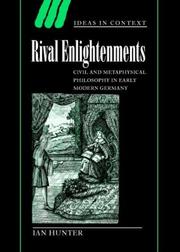
ISBN: 1107121973 0511013582 128043290X 0511174497 0511154437 0511490585 051104710X 9780511013584 0521792657 9780521792653 9780511490583 9780511047107 9780511154430 9781107121973 9780511174490 9780521025492 0521025494 Year: 2001 Publisher: Cambridge, U.K. ; New York : Cambridge University Press,
Abstract | Keywords | Export | Availability | Bookmark
 Loading...
Loading...Choose an application
- Reference Manager
- EndNote
- RefWorks (Direct export to RefWorks)
Rival Enlightenments, first published in 2001, is a major reinterpretation of early modern German intellectual history. Ian Hunter approaches philosophical doctrines as ways of fashioning personae for envisaged historical circumstances, here of confessional conflict and political desacralization. He treats the civil philosophy of Pufendorf and Thomasius and the metaphysical philosophy of Leibniz and Kant as rival intellectual cultures or paideiai, thereby challenging all histories premised on Kant's supposed reconciliation and transcendence of the field. This study reveals the extraordinary historical self-consciousness of the civil philosophers, who repudiated university metaphysics as inimical to the intellectual formation of those administering desacralized territorial states. The book argues that the marginalization of civil philosophy in post-Kantian philosophical history may itself be seen as a continuation of the struggle between the rival enlightenments. Combining careful and well-documented scholarship with vivid polemic, Hunter presents penetrating insights for philosophers and historians alike.
Philosophy, German --- History. --- Pufendorf, Samuel, --- Thomasius, Christian, --- Leibniz, Gottfried Wilhelm, --- Kant, Immanuel, --- Kant, Immanuel --- Kant, I. --- Kānt, ʻAmmānūʼīl, --- Kant, Immanouel, --- Kant, Immanuil, --- Kʻantʻŭ, --- Kant, --- Kant, Emmanuel, --- Ḳanṭ, ʻImanuʼel, --- Kant, E., --- Kant, Emanuel, --- Cantơ, I., --- Kant, Emanuele, --- Kant, Im. --- קאנט --- קאנט, א. --- קאנט, עמנואל --- קאנט, עמנואל, --- קאנט, ע. --- קנט --- קנט, עמנואל --- קנט, עמנואל, --- كانت ، ايمانوئل --- كنت، إمانويل، --- カントイマニユエル, --- Kangde, --- 康德, --- Kanṭ, Īmānwīl, --- كانط، إيمانويل --- Kant, Manuel, --- Leibnitz, Gottfried Wilhelm --- Leibniz, Gottfried Wilhelm --- Thomas, Christian, --- Tomásio, Cristiano, --- Thomasius, Christ. --- Thomasius, Thomas Christian, --- Thomasius, Christianus, --- Andersohn, Jacob, --- Anderson, Jacob, --- Ander Sohn, Jacob, --- Ander Sohn Holsatus, Jacob, --- Andersohn Holsatus, Jacob, --- Holsatus, Jacob Andersohn, --- Dunaeus, Petrus, --- Monzambano, Severinus de, --- Person of quality, --- Pufendorf, --- Pufendorf, Samuel à, --- Pufendorffius, Samuel, --- Pufendorfius, Samuel, --- Puffendorf, Samuel, --- Puffendorf, Samuil, --- Puffendorfius, Samuel, --- Rolletus, Johannes, --- Rondinus, Julius, --- Von Pufendorf, Samuel, --- 141.132 --- -German philosophy --- Rationalisme. Intellectualisme. Universalisme. Aufklärung. Verlichting --- History --- Leibniz, Gottfried Wilhelm Freiherr von --- Pufendorf, Samuel Freiherr von --- Thomasius, Christian --- -141.132 Rationalisme. Intellectualisme. Universalisme. Aufklärung. Verlichting --- German philosophy --- Philosophie. --- Geschichte 1650-1800. --- Arts and Humanities --- 141.132 Rationalisme. Intellectualisme. Universalisme. Aufklärung. Verlichting --- -History
| Listing 1 - 9 of 9 |
Sort by
|

 Search
Search Feedback
Feedback About UniCat
About UniCat  Help
Help News
News